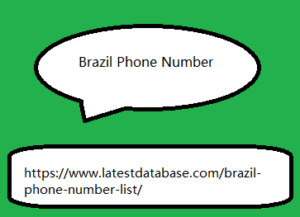Post by afifatabassum on Mar 12, 2024 4:33:43 GMT
Intelligenchatgpt_and_artificial_intelligence___traditional_sites_and_blogs_are_practically_dead Google started with the so-called snippets , i.e. quick, condensed and often exhaustive answers that appear at the top of the search results when you ask the search engine a question. The user reads the snippet, finds what he is looking for, and immediately leaves Google without visiting any site. The thing that doesn't seem very correct, in the eyes of content creators, is that Google actually fishes that answer from a site which however will never be visited by anyone, except by those few who wish to delve deeper and read everything. the article. Private sites and blogs live on advertising and if no one opens their pages they are destined to certain death, except in rare cases of ideological volunteering. But ChatGPT, if possible, manages to do even worse.
It is able to scour the web learning things and creating Brazil Phone Number real summaries, understandable and reliable, and delivering them beautifully ready to the end user who by doing so no longer even needs to use Google and its snippets! What seems paradoxical is that both Google and ChatGPT need content in order to exist, but if they put bloggers and managers of the various information portals in a position where they can no longer work, such content will slowly disappear from the internet. Google, for example, lives off advertising, much of which is conveyed through the sites and blogs that it is voluntarily or involuntarily destroying. This seems paradoxical, but it is true. Either a point of balance is found or the internet will end up in the hands of the usual suspects, i.e. the canonical newspapers, putting an end once and for all to the information plurality that had made the Internet the most democratic place on the planet, even if virtual. Traditional newspapers, in fact, churn out daily updated news talking about extremely current news or political events that obviously neither ChatGPT nor Google snippets can yet know about. They have the advantage of speed and, in fact, they alone fill the first pages of searches done online.

The usual, homologated and always the same traditional information is about to win again. Those who will die will be those vertical, personal, single-argument sites, which will probably never rise again from this summer decline. I'm talking about recipe sites, technology blogs that explain how to solve problems (see Aranzulla), sites that talk about advice for mothers, or psychology or personal growth advice, etc... Created with a lot of love and effort, with often thousands and thousands of articles, these historic portals will soon see their end as all their contents will inevitably be absorbed by artificial intelligence and condensed into exhaustive and ready-to-use summaries. Why visit Giallo Zafferano for the carbonara recipe, putting up with all that advertising, when all you have to do is ask ChatGPT and it will shove it in your face in just a few seconds?
It is able to scour the web learning things and creating Brazil Phone Number real summaries, understandable and reliable, and delivering them beautifully ready to the end user who by doing so no longer even needs to use Google and its snippets! What seems paradoxical is that both Google and ChatGPT need content in order to exist, but if they put bloggers and managers of the various information portals in a position where they can no longer work, such content will slowly disappear from the internet. Google, for example, lives off advertising, much of which is conveyed through the sites and blogs that it is voluntarily or involuntarily destroying. This seems paradoxical, but it is true. Either a point of balance is found or the internet will end up in the hands of the usual suspects, i.e. the canonical newspapers, putting an end once and for all to the information plurality that had made the Internet the most democratic place on the planet, even if virtual. Traditional newspapers, in fact, churn out daily updated news talking about extremely current news or political events that obviously neither ChatGPT nor Google snippets can yet know about. They have the advantage of speed and, in fact, they alone fill the first pages of searches done online.

The usual, homologated and always the same traditional information is about to win again. Those who will die will be those vertical, personal, single-argument sites, which will probably never rise again from this summer decline. I'm talking about recipe sites, technology blogs that explain how to solve problems (see Aranzulla), sites that talk about advice for mothers, or psychology or personal growth advice, etc... Created with a lot of love and effort, with often thousands and thousands of articles, these historic portals will soon see their end as all their contents will inevitably be absorbed by artificial intelligence and condensed into exhaustive and ready-to-use summaries. Why visit Giallo Zafferano for the carbonara recipe, putting up with all that advertising, when all you have to do is ask ChatGPT and it will shove it in your face in just a few seconds?
